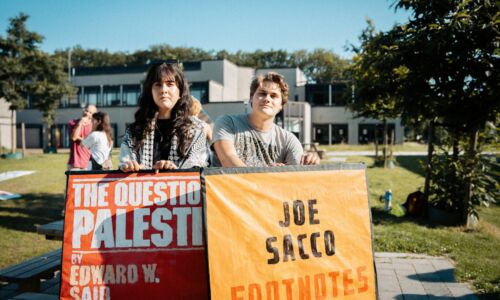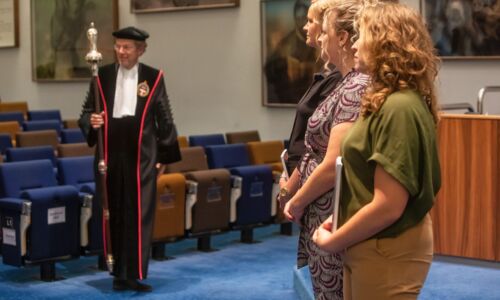Summer interview (6): Caspar Safarlou
-
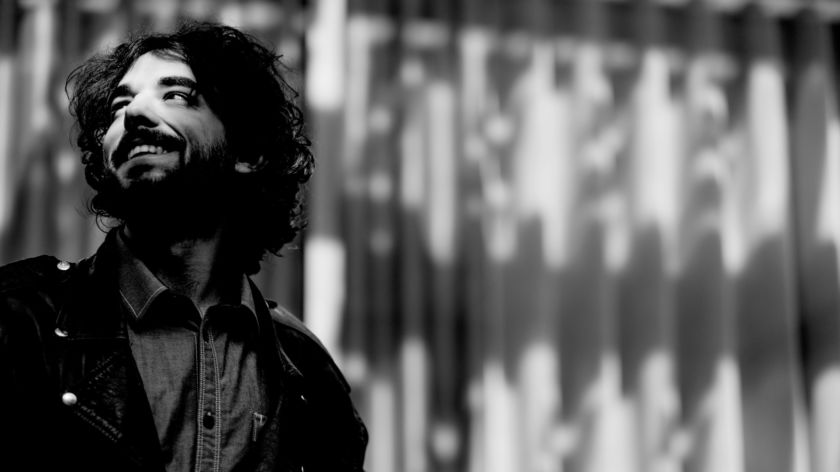 Photo: Duncan de Fey
Photo: Duncan de Fey
Inviting Diederik Stapel to the University is asking for trouble. Caspar Safarlou (22), first party leader of the Nijmegen branch of the Free Student Party, did it anyway. An interview in his parental home in Boxtel, where at weekends he talks long into the night with his Armenian father.
Boxtel, Sunday 6 March 2016. Sitting at his parents’ kitchen table Caspar Safarlou tells them about his party inviting Diederik Stapel to speak at Radboud University. His father’s response is ‘Fantastic!’ His mother looks doubtful. Is this really necessary? Surely this will lead to trouble. Why can’t they leave her ‘little man’ alone?
Caspar has no doubt that there will be trouble. In the academic world, Stapel is persona non grata. After all, he has tarnished academia’s reputation by committing fraud. Honours students previously tried to invite the social psychologist to lecture in Nijmegen, but they had to retract their invitation. This was when Caspar – together with his party The Free Student (De Vrije Student, DVS) – decided to send the pariah a friendly e-mail. ‘Everyone should be free to speak. I think we can learn a lot from Stapel’s story.’ Father Serjik Safarlou remembers clearly Caspar leaving their house on that Sunday night. Alone, on his way to Nijmegen and a university that was displeased with him. But determined nevertheless. That weekend they had gone in great detail through all the arguments and damage control strategies. ‘I didn’t send him any more messages after that,’ says Serjik. ‘If I’d called him, he might have lost concentration. Any move on my part would have damaged his authenticity.’
The next day, his son appeared on the site of national newspaper De Telegraaf. Mother Lisette, who works in the social sector, printed out the article. By that time Caspar had had a good talk with the Dean of the Faculty of Social Sciences, who was also against Stapel’s visit. ‘We couldn’t agree,’ Caspar told his parents. But this did not prevent the research fraudster from addressing a roomful of Nijmegen students on the evening of Monday 7 April. ‘I was secretly very proud of my son,’ says Serjik. ‘But I didn’t tell him that. I wanted Caspar to keep thinking autonomously.’
A bad holiday story
Three months later we are sitting at the same kitchen table in a corner house in Boxtel. Plastic tablecloth, laptop, books. Here, in front of the window with a view of the Dommel River, father and son often talk long into the night. About philosophy, science, politics, and human behaviour. ‘I learn so much from him,’ says Serjik. ‘He is my inspiration’, says his son. It was in this house that Caspar learnt to think.
His father is Armenian. He arrived in the Netherlands in 1984 as a refugee from Teheran. Under Khomeini’s leadership, Serjik could no longer say what he believed. As a Christian, he lost his freedom after the Islamic Revolution. He told his two sons – Caspar and his older brother Robbert-Jan – very little about his flight. ‘They know bits and pieces,’ he says. ‘Like a bad holiday story.’
‘Pim Fortuyn is one of my greatest role models’
This was a conscious choice on his part. He doesn’t want to burden his children. They should be given the space they need to become who they are meant to be. Caspar developed an interest in politics. In 2015 he became party leader of the Nijmegen branch of a new student party: The Free Student (DVS). A liberal voice in left-wing student politics. Serjik was enthusiastic and supported his son’s plans.
While mother Lisette – blond curls, blue eyes – asks in perfect Brabant dialect whether the visitors would like some coffee, Caspar explains how he ended up in politics. ‘In secondary school I formed a debate club with some friends. We saw debating as a form of sport. It was all about exchanging ideas. We were liberal, but we didn’t feel at home in the VVD. We talked about digital possibilities and privacy. That’s how we ended up joining the Pirate Party.’
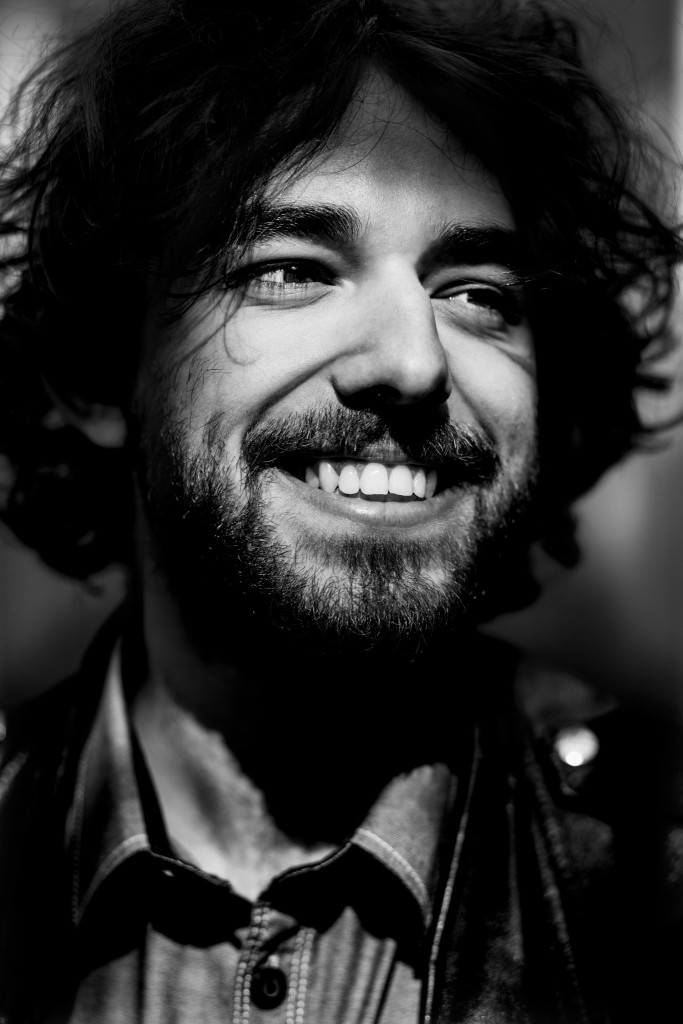
Serjik: ‘I liked the Pirate Party. A couple of young anarchists thrown together. I tried to find out more about them so that I could join in the discussion. I was relieved that my son didn’t go around throwing Molotov cocktails or occupying ministry buildings.’ But those boys were bullies. They knew a little more about programming than their teachers, so they disabled a few school computers. They also built a shadow website where pupils only had to press one button to access their timetable. Caspar laughs as he talks about it. Yes, it’s true, people did get mad at them, like the time when the Dean demanded that the site be taken offline – otherwise they wouldn’t get their diplomas! In the end the boys sold the website to the school.
For Caspar, who plans to study artificial intelligence, The Free Student represents a logical next step after the Pirate Party. Students have to make themselves heard within the universities, he says. He sends an editorial to the NRC. ‘Plush-sticky university politicians incapable of making any impact whatsoever,’ is how he refers to the current student board members.
He discusses his ideas for higher education with his father, and prepares upcoming debates for the first student council elections at home. He is in Boxtel every weekend. ‘I taught him a few tricks and interview techniques,’ says Serjik, who like his wife also works in the social sector. ‘But ultimately, he is the one who has to conduct the debate.’
Until two years ago, Serjik sat on the municipal council of Boxtel. First on behalf of the CDA, later for the local party Balans. He stopped when one day he heard himself ‘nagging like an old woman.’ He had become boring, was no longer able to contribute a fresh perspective.
At home, his sons surprised him. First Robbert-Jan, who announced at dinner one night his intention to join the the Royal Military Academy. ‘And that in a leftwing pacifist home!’ exclaims Serjik. ‘What had we done wrong?’ He is joking. It came as a bit of a shock (to say the least), but his oldest son was given all the support he needed. And then there was Caspar. Who showed up one day with Pim Fortuyn. In that very same left-wing pacifist home.
‘I really don’t mean to step on people’s toes’
‘Fortuyn is one of my greatest role models,’ explains Caspar. ‘What an amazing man, and what an amazing life.’ Caspar was eight years old when the flamboyant Rotterdam politician was murdered. He only found out about him when a school friend gave him a book about Fortuyn for his birthday. What does he find so appealing about Fortuyn? ‘His liberal ideas and his rhetoric.’ He has watched Fortuyn’s debate videos on YouTube hundreds of times. He even knows one of his speeches by heart. And no, he does not find Fortuyn’s ideas extreme (Fortuyn was critical of Islam and the ruling political elite, eds.). ‘He was an academic and he wrote very normal books.’
His father agrees with him. Fortuyn was an intellectual. Was he right-wing? Left-wing? ‘He had backbone,’ says Serjik. ‘I once attended one of his lectures. He could sometimes say bizarre things. He really made people uncomfortable, and he was often misunderstood.’ Mother Lisette joins in the conversation. ‘I identify with Pim Fortuyn’s mother,’ she says. ‘I once saw her on TV. ‘Keep your head down,’ she would sometimes tell her son. That boy meant well. And people were so mean to him.’ She points to Caspar. Another good boy. But because he does unconventional things, he sometimes gets into trouble.
According to Serjik you can use this kind of response to your advantage. If someone calls you an asshole, you can thank them. Apparently you’ve touched a nerve. It can be the start of a dialogue: where did this allergic reaction come from? Caspar is not a troublemaker, he says. ‘I really don’t mean to step on people’s toes.’ What he wants is to wake people up. Make them think about why they do what they do.
Earlier this year, he was proclaimed ‘most inspiring student’ by the student website Nultweevier. The editors were of the opinion that the DVS party leader was creative and hard-working. Caspar Safarlou, they said, was not only active in university politics, he also followed an interdisciplinary honours programme and completed the grant programme of the Thomas More Association. ‘Nice’ says Casper about his title. It’s quite a compliment to be inspiring to others.
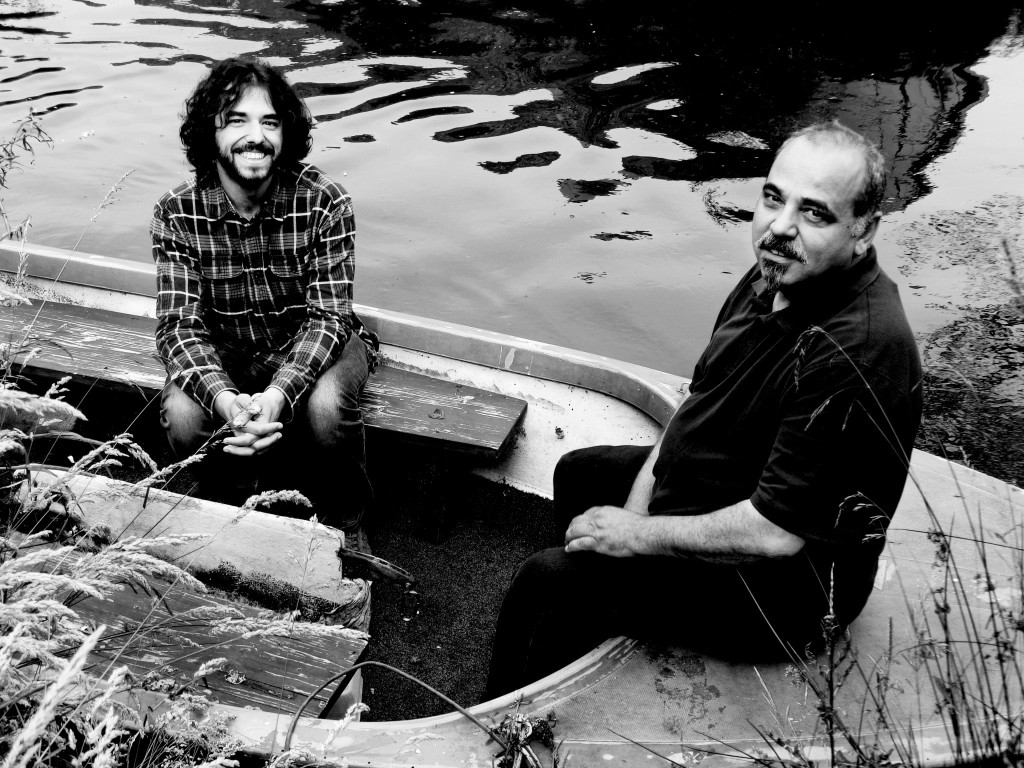
After the summer he plans to switch study programmes. Philosophising suits him better. He has enrolled in the Master’s programme in Political Theory. But he is not looking for a career in politics. ‘My year on the student council is coming to an end. I know now how things work there. I thought it was great fun, but I’m done with it.’ Caspar wants to go deeper. Right now he is fascinated by the ideas of American writer and philosopher Ayn Rand. Next to his laptop is a book about her theories that he didn’t yet share. He found a copy last weekend in an Eindhoven bookstore. It was Rand who gave him a final push in the direction of philosophy. He may do a PhD later. His father doesn’t think he will stay in the Netherlands. Caspar agrees. ‘I would like to live in a big city: Los Angeles or New York.’ He has been to the US twice, on holiday. A lot of his father’s relatives live there. What about Armenia? Is that an option? ‘No,’ says Caspar. He’s been there, together with his father. But he doesn’t speak the language, and he doesn’t know much about the country. ‘For me, these were sentimental journeys,’ says Serjik with a dreamy look on his face. ‘I thought: ‘Here in Armenia everyone is nice to me’. Of course it’s not true, but when I see those mountains, I feel a lump in my throat. I love to see the clouds dance above the land.’
In the Netherlands he is used to being discriminated against. If there is a terrorist attack somewhere, he wears a beret when he leaves the house. Let people think he is French. And what about Caspar? ‘People often think I’m Greek. Safarlou. Souflaki. Then I start saying ‘ons mam’ and ‘ons pap’, and they think: ‘Oh, he’s from Brabant’.’ Mother Lisette was born and bred in Boxtel. The house where the family lives was her parents’ home. When the boys were still living at home, there were visitors all the time. Now she waits to see where Caspar and Robbert-Jan will settle down.
Caspar is not worried about his future. He can always fall back on his knowledge of ICT. He has already been approached by employers via LinkedIn. Father Serjik refuses to tell us what profession he thinks will suit Caspar. He doesn’t want to influence him. Autonomy, that’s the most important thing in the Safarlou family.

